Starting With The Name Of Almighty Allah
Have you ever listened to a Quranic recitation that moved your heart with its clarity and beauty? This captivating quality stems from Tajweed, which is the science of reciting the Quran with precision and reverence. Tajweed ensures that every word is pronounced as it was revealed to Prophet Muhammad (peace be upon him), preserving the divine message’s integrity.
Allah says in the Quran:
“Those to whom We have given the Book recite it with its true recital. They are the ones who believe in it. And whoever disbelieves in it – it is they who are the losers.”
(Surah Al-Baqarah, 2:121)
At the core of Tajweed lies Makhraj, which is the art of articulating each Arabic letter from its correct point of origin. Diving into the specifics of Makhraj, you should also explore what Tajweed is and why it holds such profound importance for Muslims worldwide. To deepen your understanding of Tajweed’s broader context, explore What is Tajweed in Quran? Tajweed Principles & Importance , a detailed guide available on Najam Academy’s blog.
Understanding Makhraj In Tajweed
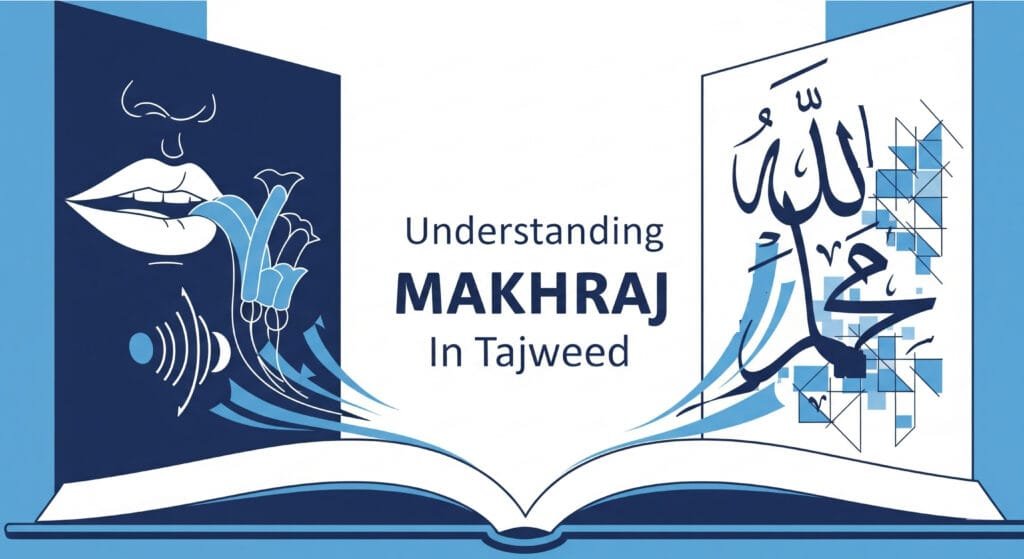
Makhraj, meaning “point of exit” in Arabic, is the precise location in the vocal tract where each letter originates. Hence, makhraj refers to the specific point in the mouth or throat where a letter is pronounced, crucial for accurate Quranic recitation. This concept is fundamental to Tajweed, the science of reciting the Quran correctly. Proper pronunciation ensures the divine message remains intact, as even slight errors can change meanings. For example, confusing ع (‘ayn) with ء (hamza) could alter a word’s significance.
Why It Matters?
The Quran emphasizes measured recitation, as seen in Surah Al-Muzzammil (73:4): “And recite the Quran with measured recitation.” Mastering Makhraj fulfills this command by enhancing both, i.e., the clarity and its beauty. It’s a skill accessible to all, with resources like Tajweed course online at Najam Academy offering expert guidance for learners. Understanding Makhraj is just the beginning; to grasp why precise recitation is vital for spiritual and intellectual growth, refer to The Importance of Tajweed And Its Purpose In Quran Reading for an in-depth discussion.
How to Learn Makhraj?
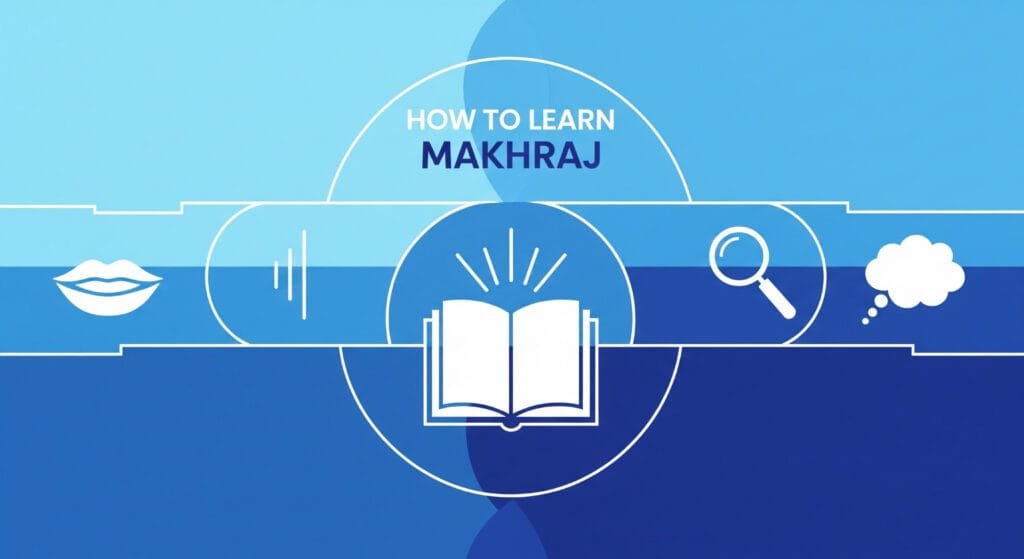
Beginners can start by listening to skilled reciters, practicing with a mirror, and seeking feedback from qualified teachers. Consistent practice and structured lessons, such as those in tajweed lessons online at Najam Academy, help refine pronunciation over time. If you want a step-by-step guide on proper articulation, see How to read the Quran with Makhraj? Learn Quran with Makharij, which provides practical techniques to master every letter’s point of origin.
Comprehensive Guide to Makhraj in Tajweed (Makharij of Arabic Letters)
Tajweed, the art of reciting the Quran with precision and beauty, is a sacred practice for Muslims worldwide. At its core lies Makhraj, the articulation points of Arabic letters. Understanding Makhraj is essential for anyone striving to perfect their Quranic recitation, as it ensures each letter is pronounced correctly, preserving the divine message’s integrity. This comprehensive guide explores the meaning of Makhraj in Tajweed, the Makharij (plural of Makhraj) of Arabic letters, their classifications, practical tips to master them, and the spiritual rewards of the struggle to master it. Whether you’re a beginner or an advanced learner, this blog aims to inspire and guide you to recite the Quran as it was revealed.
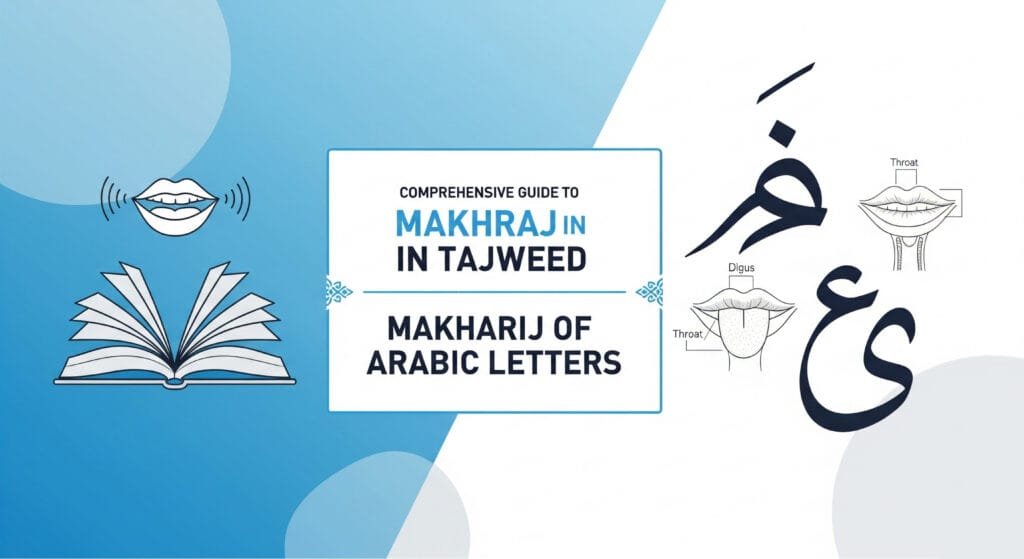
The Quran emphasizes the importance of clear recitation, as Allah says:
“And recite the Quran with measured recitation.”
(Surah Al-Muzzammil, 73:4)
This verse underscores the need for precision in recitation, which begins with understanding Makhraj. Incorrect pronunciation can alter the meaning of words, potentially distorting the Quranic message. For example, mispronouncing the letter ع (‘ayn) as ء (hamza) could change the intended word entirely. Thus, Makhraj is the foundation of authentic Quranic recitation.
What Is Makhraj In Tajweed?
Makhraj (singular) refers to the specific point in the mouth or throat from which an Arabic letter originates. The term derives from the Arabic root meaning “exit” or “point of emergence.” In Tajweed, mastering Makhraj ensures that each letter is pronounced distinctly, avoiding confusion between similar-sounding letters. The science of Makharij is critical because it helps reciters maintain the purity of the Quran’s pronunciation, as it was revealed to Prophet Muhammad (peace be upon him). To clarify the relationship between broader Tajweed rules and specific articulation points, explore What is Tajweed and Makhraj? Difference Between Makhraj And Tajweed, which clearly distinguishes these essential concepts.
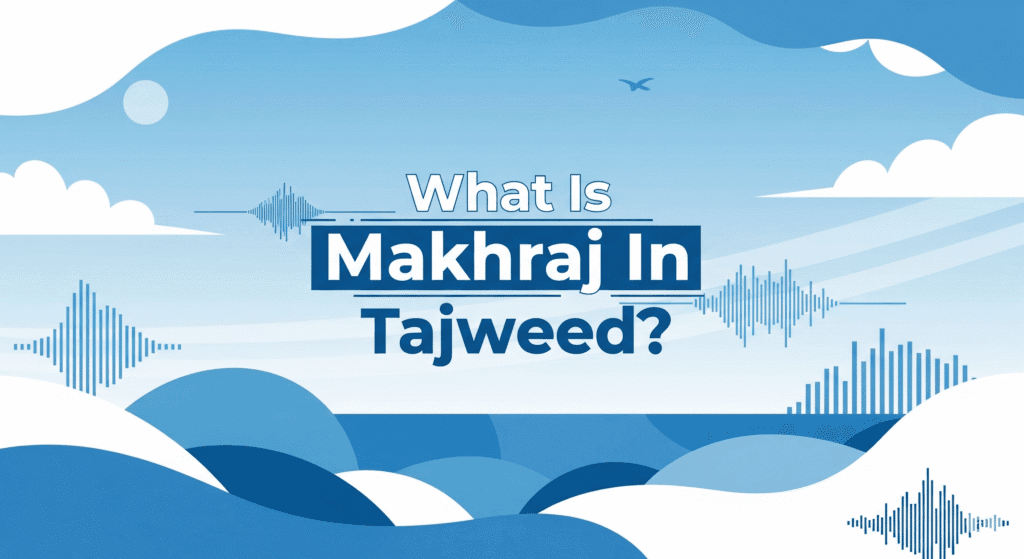
The Prophet emphasized the value of skillful recitation:
“He who recites the Quran skillfully will be in the company of the noble and obedient angels, and he who recites the Quran with difficulty and stammers will have a double reward.”
(Sahih al-Bukhari, Hadith 4937)
This Hadith highlights the spiritual reward of striving to perfect recitation, even if it requires effort. Correct Makhraj enhances the clarity and melodiousness of recitation, making it pleasing to both the reciter and the listener. For those eager to master this skill, enrolling in a Tajweed course online at Najam Academy can provide structured guidance from qualified instructors, ensuring you learn the intricacies of Makhraj with ease.
Why Makhraj Matters in Tajweed?
Mastering Makhraj is not just a technical exercise; it’s a spiritual commitment to honoring the Quran. Mispronouncing letters can lead to unintended meanings, which could distort the divine message. For instance, the word قلب (heart) could be misread as كلب (dog) if the Makhraj of ق (qaf) is confused with ك (kaf). Such errors underscore the importance of precision in recitation.
The Quran’s preservation relies on accurate pronunciation, as it was transmitted orally before being written. The Prophet (peace be upon him) and his companions recited the Quran with meticulous care, a practice continued by the scholars of Tajweed like Imam Ibn al-Jazari or Imam Abu Bakr Ibn Mujahid. Learning Makhraj ensures you contribute to this sacred tradition.
Classification of Makharij – The Articulation Points
The Arabic alphabet consists of 28 letters, each with a specific Makhraj. Scholars of Tajweed categorize the Makharij into 17 distinct points, grouped into five main areas of the mouth and throat. To understand the exact number of articulation points and their main categories, refer to How Many Makharij Are There in Tajweed? How Many Are the Main Makharij? for a complete overview. Below is a detailed breakdown of these articulation points, supported by examples:
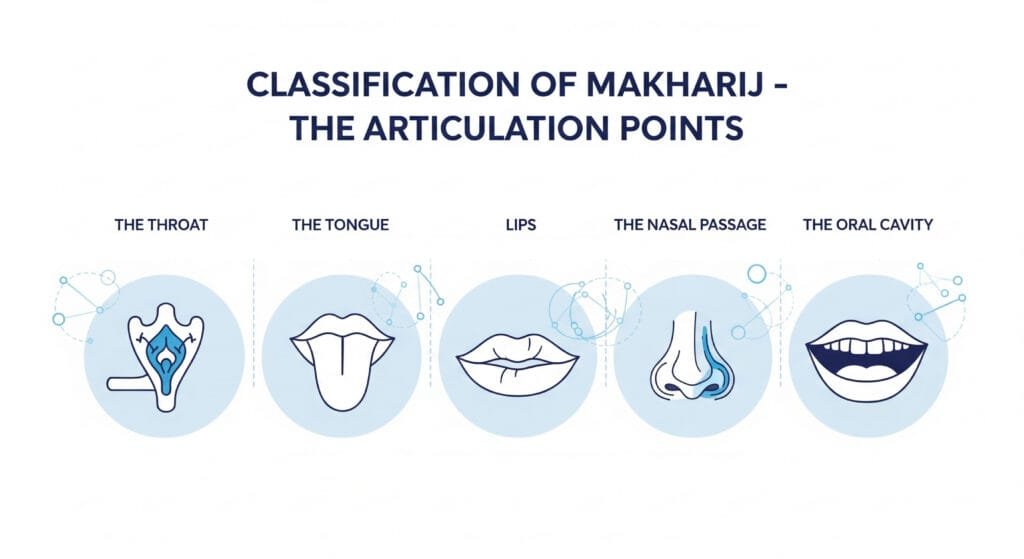
- The Throat (Al-Halq)
The throat produces six letters, divided into three sub-points:
- Deepest Throat (Adna al-Halq): Letters ء (hamza) and ه (ha).
- Middle Throat (Wast al-Halq): Letters ع (‘ayn) and ح (ha).
- Upper Throat (Aqsa al-Halq): Letters غ (ghayn) and خ (kha).
These letters require control over throat muscles to produce their distinct sounds. For example, ع (‘ayn) is a deep, resonant sound, while ء (hamza) is sharper and more abrupt.
- The Tongue (Al-Lisan)
The tongue is the most versatile articulator, responsible for 18 letters across ten Makharij. Key points include:
- Tip of the Tongue: Letters like ن (noon), ر (ra), and ت (ta).
- Middle of the Tongue: Letters like ج (jeem), ش (sheen), and ي (ya, non-madd).
- Back of the Tongue: Letters like ق (qaf) and ك (kaf).
The tongue’s flexibility makes it challenging yet rewarding to master. For instance, distinguishing between د (dal) and ض (dad) requires precise tongue placement against the upper teeth or palate. For a deeper understanding of tongue-based articulation, see What is Al Lisan in Tajweed – Makharij Al Huruf | Tajweed Rules, which explains each tongue position for precise pronunciation.
- The Lips (Ash-Shafatayn)
The lips produce four letters:
- Between the Lips: Letters ب (ba), م (meem), and و (waw).
- Lower Lip and Upper Teeth: Letter ف (fa).
Correct lip movement is crucial, especially for م (meem), which requires a nasal sound when followed by certain Tajweed rules like Ikhfa or Idgham.
- The Nasal Passage (Al-Khayshoom)
The nasal passage is the Makhraj for غُنَّة (ghunnah), a nasal sound accompanying letters like ن (noon) and م (meem) in specific Tajweed rules. This sound is prominent in rules such as Idgham with ghunnah.
- The Oral Cavity (Al-Jawf)
The oral cavity produces the madd letters (ا alif, و waw, ي ya), which are elongated sounds originating from the empty space in the mouth. These letters are critical in rules of prolongation (Madd), requiring careful control of airflow.
The following table summarizes the five main Makharij and their associated letters:
| Makhraj Area | Sub-Points | Letters |
| Throat (Al-Halq) | Deepest, Middle, Upper | ء, ه, ع, ح, غ, خ |
| Tongue (Al-Lisan) | Tip, Middle, Back, Sides | ن, ر, ت, د, ط, ج, ش, ي, ق, ك, etc. |
| Lips (Ash-Shafatayn) | Between Lips, Lower Lip & Upper Teeth | ب, م, و, ف |
| Nasal Passage (Al-Khayshoom) | Nasal Cavity | Ghunnah (ن, م in specific rules) |
| Oral Cavity (Al-Jawf) | Empty Space in Mouth | ا, و, ي (madd letters) |
For a deeper dive into Tajweed rules, including Makharij, consider enrolling in learn Quran Online with Tajweed at Najam Academy, where expert instructors simplify complex concepts for all learners. To master recitation of madd letters from the empty oral cavity, explore What is Al Jawf in Tajweed – Makharij Al Huruf | Tajweed Rules, which details techniques for accurate prolongation.
Practical Tips to Master Makharij
Mastering Makharij requires patience, practice, and proper guidance. Here are actionable tips to help you perfect your articulation:
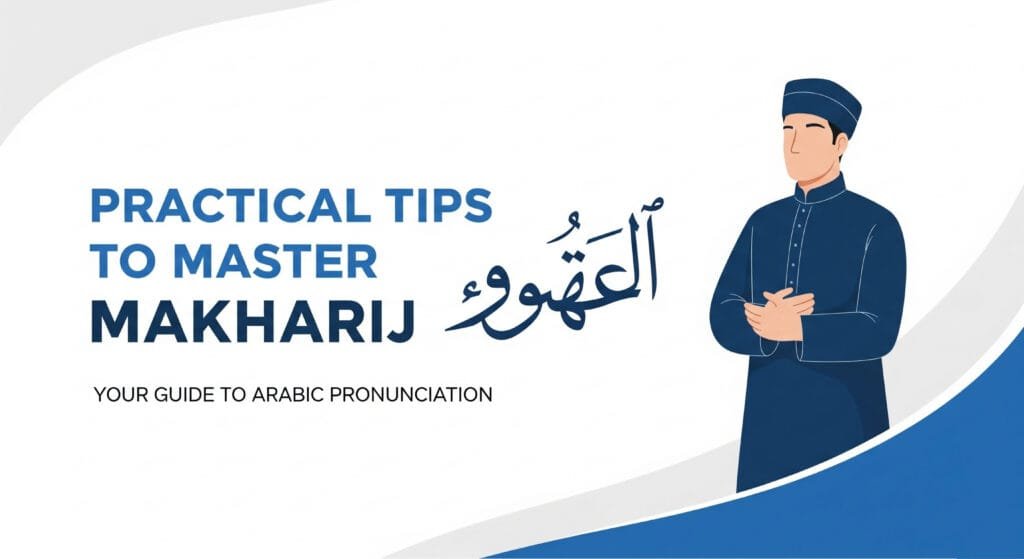
- Listen and Imitate:
Listen to renowned reciters like Sheikh Abdul Basit or Sheikh Mishary Rashid Alafasy. Imitating their pronunciation helps train your ear and tongue to recognize correct Makharij.
- Use a Mirror:
Practice in front of a mirror to observe your mouth and tongue movements, ensuring they align with the correct Makhraj.
- Work with a Teacher:
Personalized feedback from a qualified teacher is invaluable. Platforms like Najam Academy offer tajweed lessons online, connecting you with experienced instructors who guide you step-by-step.
- Practice with Repetition:
Focus on one Makhraj at a time, repeating each letter until it becomes second nature. For example, practice ع (‘ayn) by exaggerating the throat sound until it feels natural.
- Record Yourself:
Record your recitation and compare it with professional reciters to identify and correct mistakes.
The Quran encourages perseverance in learning:
“Indeed, those who recite the Book of Allah and establish prayer and spend out of what We have provided them, secretly and publicly, can expect a profit that will never perish.”
(Surah Fatir, 35:29)
This verse reminds us that the effort to perfect recitation is a rewarding act of worship.
Common Challenges in Learning Makharij
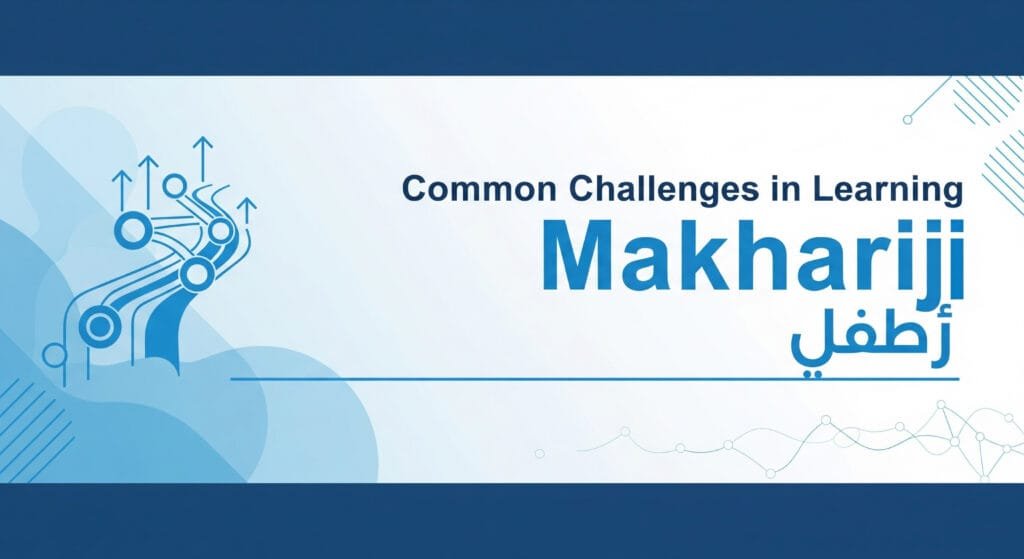
Beginners often face challenges when learning Makharij, including:
- Confusing Similar Letters: Letters like ص (sad) and س (seen) or ط (ta) and ت (ta) sound similar but have distinct Makharij. For example, ص is pronounced with a heavier, more emphatic tongue position than س.
- Weak Pronunciation: Incorrect tongue or throat positioning can weaken letter sounds, such as pronouncing ق (qaf) too softly, resembling ك (kaf).
- Lack of Feedback: Self-learning without a teacher can lead to unnoticed mistakes, making it harder to correct habits over time.
To overcome these challenges, structured learning is key. Enrolling in an Online Quran Academy like Najam Academy provides access to qualified instructors who offer personalized feedback, helping you refine your pronunciation and build confidence.
The Spiritual Benefits of Mastering Makharij
Beyond technical accuracy, mastering Makharij deepens your connection with the Quran. The Prophet (peace be upon him) said:
“The best of you is he who learns the Quran and teaches it.”
(Sahih al-Bukhari, Hadith 5027)
By mastering Makharij, you not only improve your recitation but also become better equipped to teach others, fulfilling this prophetic encouragement. Correct recitation is a form of worship that brings one closer to Allah, as the Quran states:
“Those who recite the Book of Allah, and establish prayer, and spend (in charity) out of what We have provided for them, secretly and openly, hope for a commerce that will never perish.”
(Surah Fatir, 35:29)
This “commerce” refers to the eternal rewards in the hereafter for those who engage with the Quran sincerely. Mastering Makharij also enhances the emotional and spiritual impact of recitation, making it a transformative experience for both the reciter and the listener. To explore the broader benefits of Tajweed, check out Benefits Of Reading Quran With Tajweed on Najam Academy’s blog.
Conclusion
Mastering Makhraj in Tajweed is a journey that requires dedication, but the rewards are immense, both in this life and the hereafter. By understanding and practicing the articulation points of Arabic letters, you ensure that your recitation of the Quran is accurate and beautiful, just as it was revealed. Whether you’re a beginner or seeking to refine your skills, resources like Najam Academy’s Online Quran Academy offer expert guidance to make this journey accessible and rewarding.
The path to mastering Tajweed is ongoing, but every step brings you closer to the heart of the Quran. May Allah bless your efforts and make your recitation a source of light and guidance.




